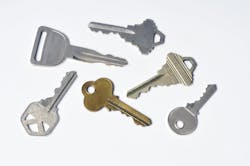Back Page, July 2025
10 Years Ago
July 2015 was our new products issue that year, and Gale Johnson and Jerry Levine were headed to ALOA to check out these new products. The 2025 crop (many still in use today) included: CompX SlamCam, Alarm Lock Networx ArchiTech, Sargent indicator rim exit devices, the Schlage NDE Series with Engage Technology, Capitol Industries’ magnetic cam lock and KSP’s convertible rim/mortise housings. Product articles looked at the newest offerings from Trimco and Codelocks, as well as the Keyline Ninja Laser. An article on wireless systems found that “Wireless products comprise 70 percent of all electronic access control systems being installed today.” Steve Young wrote about how automotive locksmiths could profit by selling and servicing keyless entry remotes. Smart electromagnetic locks was another July 2015 article. Jerry Levine reported on the repair of an opening damaged by harsh weather. This door repair included replacing the existing threshold, perimeter weather stripping and door gap protection. An article on touchless door openings for hospitals in 2015 was ahead of its time, six years before Covid made the news.
20 Years Ago
Tom Gillespie put the finger on biometrics access control products. Tim O’Leary reported on the Trine 3000 modular program. Jerry Levine reported on vandal-resistant hardware. Dick Zunkel suggested door operators as a new market segment for locksmiths. The ALOA convention was in Chicago. Steve Young introduced some special tools for making auto keys. Barnes Distribution showed their new BD Blazer sidewinder originator machine. Dugmore & Duncan reported on their new access control lab in California. Rod Oden showed the business side of helping a customer develop the best master key system for their purposes. Jerry Levine installed a Norton LEO 5700 low energy door operator. Strattec introduced their new Lok Shot auto lock lubricant. Jet Hardware introduced a program to rent display space in locksmith stores. Bill Neff explained how the VW & Audi Pin code system operates. Tim O’Leary looked at new digital CCTV systems. Tiny serviced the locks on a Pontiac GTO, which is actually a Holden from Australia.
Could Keys Be Banned in Minnesota?
At press time, Minnesota legislation banning lead for consumer products – including most keys – was scheduled to go into effect July 1. If this legislation takes effect, locksmiths and distributors will be banned from selling common house and car keys.
Keys are made primarily of brass, with a small amount of added lead that’s needed to make them durable enough to be cut and stand up to daily use.
"Approximately 75 percent of all products that we stock have become prohibited for sale," Minnesota-based Doyle Security’s Rob Justen stated in a local television interview.
This misguided state law bans lead in numerous products, including toys, jewelry, cosmetics and keys. It took effect in January. 2024, and the Minnesota Pollution Control Agency is scheduled to begin enforcing it in July.
The purpose of that law was to remove dangerous heavy metals from products that come into contact with children. The trouble is that almost all keys sold today have more lead than the new law's 0.09 percent limit on lead content.
Lawmakers have proposed a range of fixes, including raising the lead threshold to 1.5 percent for keys (which is California's standard) or delaying the ban for another three years. A special session of the Minnesota legislature is planned, but a legislative fix is not locked in yet.
